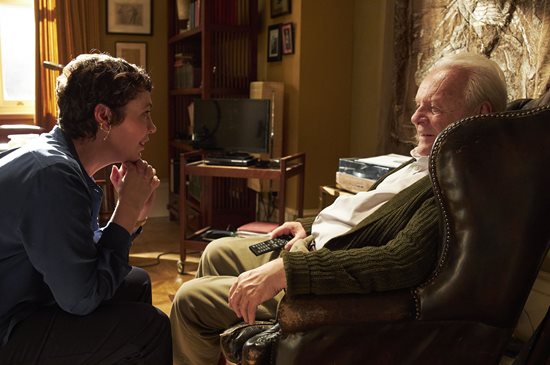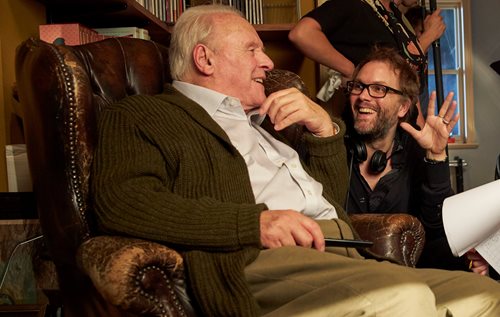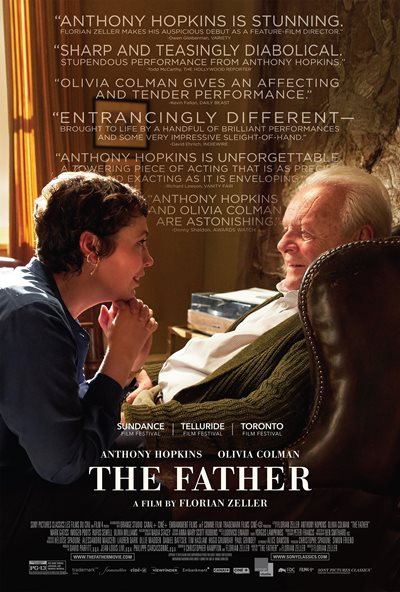
Triple Your Impact This Holiday Season
Triple Your Impact This Holiday Season
Celebrate the holidays with a year-end gift that can go 3x as far to help provide care and support to the millions affected by Alzheimer's disease, and to advance critical research. But please hurry — this 3x Match Challenge ends soon.
Donate NowOscar-Nominated Film “The Father” Navigates Dementia Through the Eyes of a Man Living It
In writer-director Florian Zeller’s film directorial debut, Academy Award winners Olivia Colman and Anthony Hopkins play a daughter and her father, facing the dynamics of caregiving and the progression of dementia. We spoke to Florian about the film, adapted from his original French play “Le Père,” and how he used the film set as a labyrinth to challenge the audience to see things from the perspective of a man living with dementia.
Florian, you are an accomplished playwright. What made you adapt your play into a film?
When I wrote “Le Père” eight years ago, my writing began due to my personal experience. I was raised by my grandmother, who was like a mother to me. When I was 15 years old, she began to struggle with dementia. As I was on that difficult journey, I realized that sometimes, when you love someone, love alone is not always enough. “The Father” is about sharing the emotions around the experience of dementia, knowing that eventually we will all face a dilemma in our lives that asks: “What do I do next?”
I was surprised and moved that the response of the audience was so powerful in Paris, where the play debuted, and then many countries where the show was later staged. No matter where we went, no matter what language was being spoken, the reaction was the same. People were waiting for us after every performance, to tell their own stories of being affected by dementia, and sharing those personal moments with us. It can be cathartic, having this fraternity despite the pain: people to turn to, people who have lived an experience, no matter how difficult it may be, and sometimes because of how difficult it can be.
With “The Father,” I wanted to put the audience in a unique position of truly living a film, asking themselves life’s important questions: What could it mean to lose everything? What is real, what is not? And as a playwright, I thought cinema could make the experience even more immersive, so the audience feels like they are in the mind of the character. The film reminds everyone that we are all connected, and part of something bigger than ourselves.
Would you speak more about the film as an experience, and how you used the set to convey the experiences of the characters?
The film is like a puzzle to figure out. In the beginning, you look for the logic, and play with all the pieces to make it work, like you do with any puzzle. But there is always a piece missing, right?
 When adapting to film, most plays add new scenes outdoors to make a film more cinematic. I chose to stay in the space of Anthony’s apartment, so it is like a character all its own, changing all the time: a labyrinth. [The film’s character shares the same first name as Hopkins, something Florian changed for the film.]
When adapting to film, most plays add new scenes outdoors to make a film more cinematic. I chose to stay in the space of Anthony’s apartment, so it is like a character all its own, changing all the time: a labyrinth. [The film’s character shares the same first name as Hopkins, something Florian changed for the film.]
At the beginning of the story, we are in Anthony's space; we see his knicknacks, his furniture. But then, in the background, there are small changes, a metamorphosis: you recognize the space, but you know that something is different. You start doubting everything.
While there are many contradictions in the narrative as we begin to explore the world through Anthony’s eyes, it’s my hope that the audience will relate to the confusion he is experiencing as his dementia progresses, rather than trying to figure out what is coming next.
Anthony (Hopkins) refuses assistance from his daughter (Colman) and begins to doubt his own mind throughout the film. How did you approach portraying these struggles?
I wanted the film to be as truthful and visceral as possible, with Anthony using his own memories and fears to explore emotions in the scenes. So I asked Anthony and Olivia not to do any research to inform their performances, and we didn’t rehearse ahead of time. Anthony explored a different side of himself, connecting to his own anxieties and feelings about mortality, which was so meaningful. This performance was brave of him, and so generous.
This film is called “The Father” but is also about the father’s daughter. Sometimes we feel as if we are the only ones to go through a painful situation, and it feels as if the world is becoming smaller and smaller. Throughout the film, we are always in Anthony’s apartment, and the one time that his daughter Anne leaves that space, she gets a phone call and has to go back inside. As a caregiver and as a daughter, she returns to those four walls, as if the rest of the world doesn't exist anymore.
We know that caregivers can feel so alone. By sharing our hopes, fears and desperate moments, it may not change our situation, but by being open, we remind others that they are not alone. Our humanity is what keeps us all connected, and it’s through that humanity that we find help.
Tell us about the pivotal scene when Anthony breaks down. What was filming like that day?
This scene was always going to be the destination of the film. And filming it was a magical moment. I was asking Anthony to go through very personal emotions several times. He used an object on the set to bring him back to a particular moment in his life; later he recalled a lullaby his mom used to sing to him. Those on set watched him reconnect with these moments of being a young boy as he played the scene.
 It was intense, and I knew it was what we wanted to capture. I ran to Anthony and he took me in his arms as everyone else on set cried. It was a strangely joyful moment, a great moment of honesty, connected to memory.
It was intense, and I knew it was what we wanted to capture. I ran to Anthony and he took me in his arms as everyone else on set cried. It was a strangely joyful moment, a great moment of honesty, connected to memory.
What do you hope viewers will take away from the film?
I approach film as a place for questions, and I want an audience to come in with their own sensibilities and experiences. Ultimately, the answers come from the audience.
It can be so difficult for family caregivers to make the right decisions and this is not about saying: ‘Anne should do this’ or ‘she should do that.’ When you become a parental figure to your own parent, it is so complicated, and you aren’t going to have a book of answers. But there are plenty of questions.
Life is about sharing experiences so we can all share these questions and answers. Even if you don't have a personal connection to Alzheimer’s or dementia in your own family, you understand. It is the human experience. It is about love, and tested love. It is about family ties, and the importance of being connected. We are never alone. And even when you cannot remember the memories you share with someone, you are still connected.
Being alive and connected is such a gift. The film is about the fragility of life, something we have all experienced over the last year, the pain of being separated from those we love. I hope the film encourages people to be more compassionate in these unique times. And as audiences consider the complexities of the film, I hope everyone will take one thing away from the experience: Even when someone doesn't remember who you are, you can still share your heart with them. Put those you love at the center of everything.
 About: Florian Zeller adapted his play alongside co-writer and Academy Award winner ("Dangerous Liaisons") Christopher Hampton. Florian is a French novelist, playwright and director currently working on his follow-up to “The Father,” entitled “The Son,” based on his play of the same name.
About: Florian Zeller adapted his play alongside co-writer and Academy Award winner ("Dangerous Liaisons") Christopher Hampton. Florian is a French novelist, playwright and director currently working on his follow-up to “The Father,” entitled “The Son,” based on his play of the same name.
"The Father" won the 2022 César Award (France) for Best Foreign Film.
“The Father” tackles topics including facing a dementia diagnosis and accepting help. If you or someone you know needs help navigating an Alzheimer’s or dementia diagnosis, you are not alone. Call the Alzheimer’s Association free 24/7 Helpline at 800.272.3900 to speak to someone confidentially, or learn more on our website.
Photos in this post are courtesy of Sony Pictures Classics.

The first survivor of Alzheimer's is out there, but we won't get there without you.
Donate Now
Learn how Alzheimer’s disease affects the brain.
Take the Brain Tour
